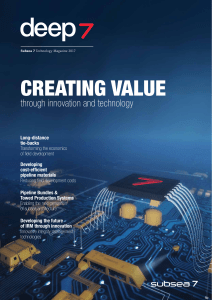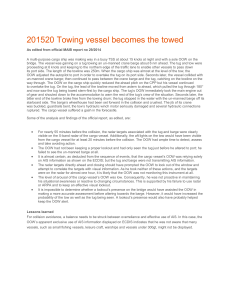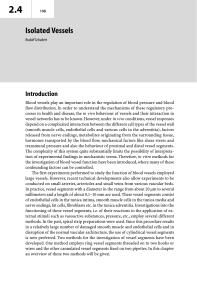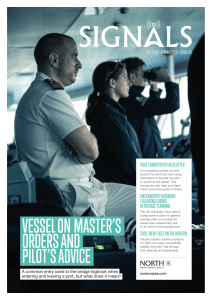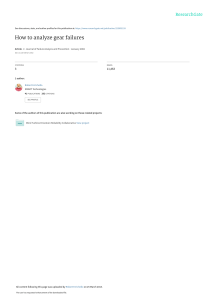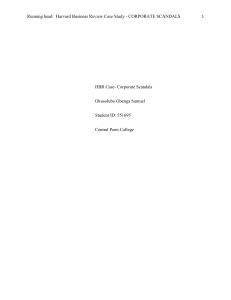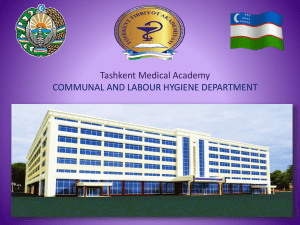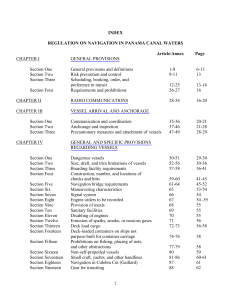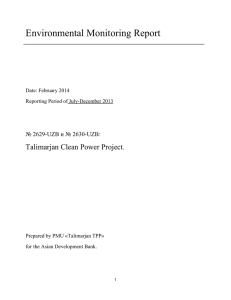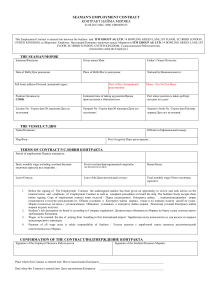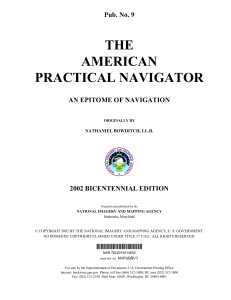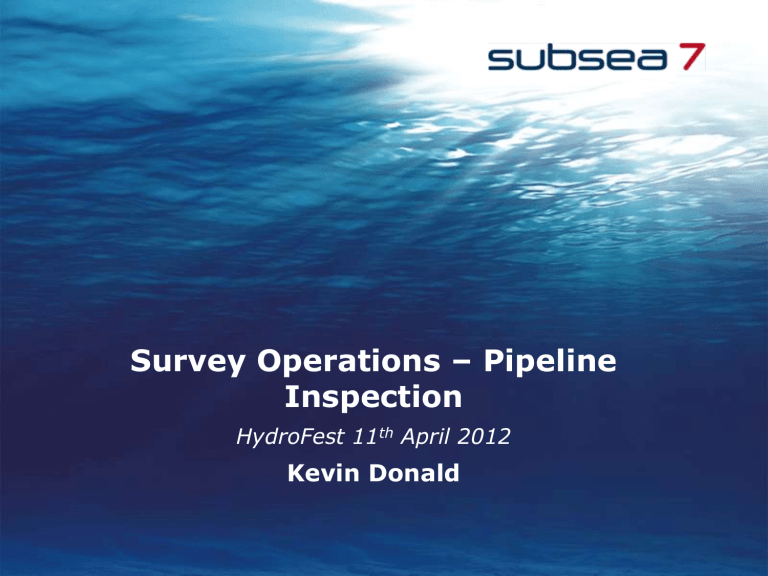
Survey Operations – Pipeline Inspection HydroFest 11th April 2012 Kevin Donald Why Inspect? Agenda Definition of a Pipeline Types of Survey Positioning Data Processing The Future Conclusions 24-Apr12 Page 2 Why Inspect? 24-Apr12 Page 3 Legislation – Statutory Instruments Cost of Failure Why Inspect? • Pipelines Safety Regulations 1996 – To apply a common approach to the control of risks from pipelines, both on and offshore ‘‘The operator shall ensure that a pipeline is maintained in an efficient state, in efficient working order and in good repair.” 24-Apr12 Page 4 – To replace existing pipeline safety regimes with a single goal-setting group of regulations reflecting the general policy of the HASAWA 1974 Why Inspect? • Regulation 13 addresses pipeline maintenance and inspection requirements – “The pipeline operator needs to consider both how and when the pipeline should be surveyed and examined to validate and maintain it is in a safe condition.” 24-Apr12 Page 5 Why Inspect? • Cost of Failure – Environmental – Loss of Production – Repair / Replacement cost 24-Apr12 Page 6 Riser / Spoolpiece Pipeline Definition Sealine Landfall 24-Apr12 Page 7 Pipeline Definition • The Riser – connects production facility to subsea field • The Spoolpiece – connects riser to sealine • The Sealine – main export pipeline • The Landfall – connects sealine and landfall terminal 24-Apr12 Page 8 Pipeline Definition - Riser/Spoolpiece • Most vulnerable in Splash Zone and can degrade rapidly due to – – – – – – Instability Current Wave Action Corrosion - electrical & chemical Movement Impact - Collision • Inspection options – – – – 24-Apr12 Page 9 Above sea level - RATS Splash Zone - RATS / divers Subsea - DP Vessel & ROVs Subsea - Platform based ROVs Pipeline Definition - Sealine North Sea • 20,000+km “pipeline” • Pipelines: gas & oil & water • Umbilicals - electric, hydraulic, chemical elements. • Cables - electrical & fibre optic • Multifunction pipeline bundles At risk from • Anchors & Trawl gear • Instability • Current & Wave Action Main Types of Inspection • GI = Acoustic sensors • GVI = Visual sensors 24-Apr12 Page 10 • Corrosion - electrical & chemical • Buckling (upheaval & lateral) • Munitions Pipeline Definition - Landfall The part of the export pipeline in the inshore zone •TOB to @ 3km offshore. •Through the inter-tidal zone. •Buried, rock-dumped or in conduit. •Protected At Risk From: •Anchors & Trawl gear •Munitions •Very Strong Currents •Wave Action - to seabed •Erosion / Deposition •Beach activities •Corrosion - chemical & electrical Main types of Inspection Conventional Inshore and Land Survey Methods 24-Apr12 Page 11 General Imaging (Acoustic) Types of Survey General Visual Inspection Landfall RATS Diver 24-Apr12 Page 12 Types of Survey Inspection Survey Platform Type / Method Component RATS Platform based Visual - cameras NDT techniques Riser Riser Platform or Diver DP vessel based Visual - cameras NDT techniques Pipeline Point structures Landfalls Inshore survey vessel Acoustic Pipelines CP snake Structural GVI Oil platform or DP survey vessel 3 X Eyeball ROV’s Visual – cameras NDT techniques FMD Down to splash zone Weather Depth, Current Weather, Sea state HSE Inshore only Hull mounted Landfall GI Notes / Restrictions Weather, tides Seastate @ 1m Fishing gear Legs Weather Structural members Sea state @ 2m Risers Current, Visibility Seafloor structures only Pipeline GI Survey vessel ROTV Towed SSS Acoustic Pipelines Cannot stop Structures Current restrictions Seastate @ 2m Pipeline GVI 24-Apr12 Page 13 DP survey vessel WROV DP follow sub Riser Current restrictions Visual – cameras Pipeline Visibility CP Structures Seastate @ 4.5 – 5 m Types of Survey – General Imaging (GI) Sensors • Sidescan Sonar • Multibeam Echosounder • Single Beam Echosounder • Sub-Bottom Profiler • Magnetometer Sensor Platforms • DP Vessel • Towfish • ROTV • AUV 24-Apr12 Page 14 Types of Survey – GI Side Scan Sonar Typical Pipeline Fingerprints A Pipe in contact with the seabed B C D E Pipe clearly spanning Pipe in area of shallow scour Pipe in suspension in scour trench Pipe with seabed buildup away from sonar F Pipe with seabed buildup towards sonar 24-Apr12 Page 16 Types of Survey – GI 24-Apr12 Page 17 Types of Survey - GI • Upheaval Buckling 24-Apr12 Page 18 Types of Survey – GI Multibeam Bathymetry Point soundings used to create DTM Shaded Relief and or Contours created from DTM 24-Apr12 Page 19 Types of Survey – GVI Typical Focus Areas • Lay comfort • Freespans • Pipeline damage • Debris • Anodes and cathodic protection • Seabed features and targets • Pipeline and cable crossings • Lateral movement 24-Apr12 Page 20 Types of Survey – GVI Sensors •Cameras •Depth •Altitude •Cross Profilers •Pipetrackers •MBE Bathymetry •SSS •Cathodic Protection •Temperature 24-Apr12 Page 21 Types of Survey – GVI • Cross Profilers 24-Apr12 Page 22 Types of Survey – GVI • Dual Cross Profilers • ROV High Fly • ROV Low Fly ROV High Fly ROV Low Fly MBE MSB Pipetracker Flowline 24-Apr12 Page 23 Types of Survey – GVI • GVI of Upheaval Buckle • Estimated height 4m • Bottom left image taken from ROV sitting on seabed 24-Apr12 Page 24 Types of Survey – GVI UXO • Air dropped mine • Ordnance adjacent to pipeline 24-Apr12 Page 25 Types of Survey – GVI • Examples of damage to pipelines 24-Apr12 Page 26 Types of Survey – Landfall Sensors and Methods •MBES •Sidescan •Sub bottom profiler •Trailing Wire CP •RTK GPS •Small ROV •Divers 24-Apr12 Page 27 Types of Survey – Risers and spools Sensors and Methods • Rope Access Teams above splashzone • Cameras on poles / divers in splash zone • Eyeball ROV to the seabed Vessel or platform deployed 24-Apr12 Page 28 Surface Positioning Sub Surface Timing 24-Apr12 Page 29 Positioning Surface • GNSS – RTCM, PPP • RTK • INS – IMU/Heading • Range bearing systems Sub Surface • USBL • INS • IMU • Doppler Log • Pressure Sensor • CTD/SVP 24-Apr12 Page 30 Navigation Sensor Data Data Processing Pipeline Events Data Formatting/Deliverables QC Data Storage 24-Apr12 Page 31 Data Processing • Process Navigation – remove outliers, run filter • Process Depth/Pipetracker – apply tidal correction • Clean Cross Profiler/MBE data • Create 5 point files • Review and Event Video • SSS Target Interpretation • Create Charts/Report • Format data for client specified deliverable • Data management 24-Apr12 Page 32 Data Processing 24-Apr12 Page 33 Data Processing What the client wants • Anomalies threatening integrity of asset - immediate • Significant features - 24hrs • All observable anomalies - 7 days • Survey report and all events 4 weeks 24-Apr12 Page 34 Data Processing Integrity Management: Pipeline Reporting Inspection System Multimedia • Historical data allows trend analysis • Drill down to detail • Plan future Inspections • Plan remedial works 24-Apr12 Page 35 Data Processing Anomalies Identify Pipeline features that: •Fall outside given criteria •Cause concern for the integrity of the pipe 24-Apr12 Page 36 Video The Future AIV GIS 24-Apr12 Page 37 The Future Video •HD •Improved resolution & image/colour definition •3D •Depth of field •LED Lighting •Shock resistant & longer life Challenge •Data volume 24-Apr12 Page 38 The Future - AIV • Provides a cost-effective, low-risk inspection system to aid field survey and integrity management and intervention activities • Operates directly from a host facility e.g. FPSO, platform or infield support vessels • The AIV has no tether which enhances vehicle manoeuvrability and the capability to access confined spaces • The AIV carries an array of navigation tools and sensors that are powered by its own onboard battery power source. 24-Apr12 Page 39 The Future GIS • Slow adoption in the Oil Industry • Can be delivered across the internet • Repository for all pipeline data with a spatial component 24-Apr12 Page 40 Pipeline inspection is a mature business Methodologies for the use of the current tools are well established Summary New technology continues to deliver cost and efficiency benefits along with implementation challenges The client in the office is getting closer and closer to the data 24-Apr12 Page 41 seabed-to-surface www.subsea7.com 10.01.11 Page 42
